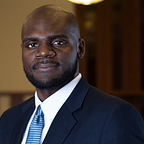Got Royalty Inside Our DNA
What Black Panther Means To Me
To the people and descendants of the so-called “s**thole countries” of the world, allow me to quote a poet from Compton:
I got, I got, I got, I got —
Loyalty, got royalty inside my DNA- Kendrick Lamar
The story of black people does not begin with slavery. It does not begin with those images of war and starvation and disease that so often flash across our television screens.
Our story begins with and will always be one of royalty. And when I say royalty, I do not mean it in the narrow sense of descending from the most powerful or wealthiest members of a society.
Black people are royal, each one of us born kings and queens, because our beautiful and diverse histories are full of dignified people. Regardless of power, regardless of wealth or status, black people around the world have survived the worst forms of oppression, and yet we have not given up as a people. That is the true definition of royalty.
Somewhere in America today, a little boy or little girl learned that he or she is black. When that little boy or girl was called a n****r for the first time in their life, they got their first lesson in the long history of anti-blackness that enables the state to arrest, incarcerate, shoot, and kill black people unjustifiably every year with impunity.
I am a black person in America. I recognize that anti-blackness was built into the very foundation of this country. It is the poison that places black people at the bottom of an imagined hierarchy of races. I also recognize that anti-blackness exists not just in white cultures. Anti-blackness is learned and it must be unlearned.
I recognize all of this to be true. And yet, I am not without hope.
It is the story of liberation in America. When black people get free, we all get free. Abolitionism inspired and gave power to the Women’s Suffrage Movement. The Civil Rights Movement inspired and gave power to the Chicano Movement and the Gay Liberation Movement.
We have the power to make all of America more free by representing black history, black culture, and black people in a way that reflects Kendrick Lamar’s vision of blackness, rather than that of the 45th president.
In 2018, there is perhaps no film better slated to do just that than Marvel’s Black Panther. Last week, it was reported that Black Panther is the most anticipated film in Marvel’s distinguished cinematic history according to advance ticket sales.
Black Panther will tell the story of T’Challa, the King of Wakanda, the wealthiest and most technologically advanced nation in the Marvel Universe.
Wakanda may be a fictional African country, but its imagined lore has a very real impact. Wakanda is an African country that has never been conquered. The nation is home to a precious metal called Vibranium that powered the country’s technology beyond that of any other in the world. The country’s borders are also naturally protected by hills, mountains, and a sprawling lake so that, while many have tried, all (yes, including European nations) have failed to conquer it.
Wakanda is therefore the manifestation of an African people, an African history, and an African culture that never felt the stain of colonization. The ultimate, ‘What if?’ It is an imagined world that inspires me to take pride in my blackness in this real world that tries to tell me that I am less than, that I am other, every day.
Ta Nehisi-Coates, the current author of the brilliant Black Panther comic, wrote the just as brilliant essay “The Case for Reparations.”
Like Coates, I believe that the U.S. Government is morally obligated to pay reparations to the descendants of families directly harmed by slavery and Jim Crow. While it is difficult to see that happening any time soon, the reparations that are in order are not just economic.
There is also a psychological aspect to reparations that must be addressed if racism is to be truly overcome. This country’s inability to honestly grapple with its deep-seated racism is a harm that cannot be overstated. The racial injustices in our society all rest upon this collective denial so that today there still exist vast racial gaps in education, in the criminal justice system, and in wealth.
Thankfully, we do not have to wait for any government to make this part of reparations real. For if we as individuals learn to reach deep inside our hearts so that in our daily lives, in our daily work and interactions, we find ways to uplift the innate royalty, that is, the inherent dignity, in all black people, then we affirm the most marginalized among us and and lift this nation one step closer to its ideals.
So say it with me:
I got, I got, I got, I got —
Loyalty, got royalty inside my DNA
If you enjoyed this piece and you would like to support my writing in other ways, please check out my first short work of fiction, Frederick Douglass and the John Brown Scouts, available now on Amazon.
